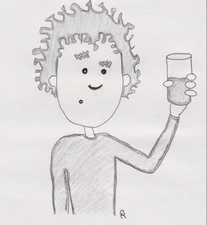
Recently, I accompanied a friend to her doctor’s appointment. Over a year ago, she had been diagnosed with diabetes, my specialty. She is what Dr. Jerome Groopman and Dr. Pamela Hartzband refer to in their book Your Medical Mind, as a doubter. Over the past year she reluctantly embraced treatment. With medication and life-style changes she has lost 30 pounds and returned her Hbg A1C (a blood test that predicts complications related diabetes) to well below recommended levels. She’s a success story. So why was I not surprised when she declined to receive the flu and pneumonia vaccine that her doctor recommended?
Because, as a doubter, she’s also a profound skeptic. She questions how much benefit a therapy really offers and what could be the harmful consequences.
I’m what the book calls a believer. I approach my options with a sense that there is a successful solution for my problem somewhere.
The authors also define people as maximalists and minimalists. A believer can shun high-tech intervention and have a strong belief in the healing power of nature. Or a believer can embrace the latest technology modern medicine has to offer. If the person is a maximalist, they believe that more treatment is the best approach and that doing less is shortsighted. A minimalist will embrace only such treatments as are absolutely necessary. Doubters are usually minimalists. That’s my friend. We become doubters because of various life experiences – we saw someone suffer from too much care, the wrong care or care that feel short of expectations.
Groopman and Hartzband tell us that another powerful influence on our thinking is the “focusing illusion.” When considering a decision about a medical treatment we try to focus on the future and a particular aspect of our life that would be negatively affected by the proposed treatment. What we might lose becomes the main factor in our decision-making. The book validates the difficulty many of us face in the health care arena – our doctors’ recommendations, dissenting expert opinions, confusing statistics, sensational media reports, our friends’ advice, Internet claims, and drug company ads. Conflicting information pulls us back and forth.
That’s how we make health decisions for ourselves but what about for our children? Two hot topics in the news caught my attention recently: cholesterol screening for children and the debate raging over the Center For Disease Control’s recommendation for boys 11 and 12 to receive the HPV vaccine. Both decisions force a parent to look into the future, a future that they may not even live to be part of, but which their decision will undoubtedly affect.
In one case, the testing for cholesterol, the parent can find out if their child is at risk for heart disease. Months ago on CBS news, Dr. Holly Phillips stated that 12.5 million kids in our country are obese, but not all have high cholesterol. The testing will give parents a heads up, so that they can intervene with healthful diets and exercise before changes to the blood vessels start occurring. To find out your child may have a higher risk of blood vessel disease may be disturbing, but it’s a warning that could lead to positive changes that alter the future. As I said to my friend when she was having her blood drawn to see how her diabetes was doing, “It’s information. It’s not a judgment; it’s just information.”
Driving on the freeway the other day I saw a billboard that read: “He’s off to college. It’s too late to talk about alcohol.” How true! We parents have our chance to speak and be listened to before our kids hit puberty. After that, we’re out; it’s their peers.
So what in our medical mind allows us to process the yucky subject of a vaccine to prevent a STD? How do you look into the eyes of your prepubescent son or daughter and explain that they, as well as over 50% their friends could someday be infected with a virus that causes: oral cancer, cervical cancer, penile cancer, anal cancer and oral cancer? How do you explain the need for this vaccine when 11-year-old boys think that girls have “cooties” and girls their age think that boys are “gross.”?
How about telling them that the vaccine they are receiving prevents cancer caused by a virus? Now, you may have to explain what cancer is, maybe even what a virus is. I suppose it’s possible that an 11 year old will press for details as to how the virus is transmitted. Good. In that case you, and not their peers, get to be the one to explain. Remember though, it’s always good to start simple and only answer the question asked.
I’m reminded of the story of a child who inquired, “Mom, where did I come from?” Figuring the time had come, she took a deep breath and explained the birds and bees in great detail. The kid looked confused. “No, I mean; one of my friends said he was from Chicago. I was just wondering where I came from.”
http://www.latimes.com/health/boostershots/la-heb-promiscuity-hpv-vaccine-20121015,0,5783319.story?track=rss&utm_source=dlvr.it&utm_medium=twitter&dlvrit=53001
 RSS Feed
RSS Feed
